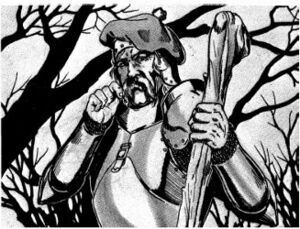Avatar (Roleplaying)
An Avatar is a physical manifestation of either a god or a concept. In most fictional or roleplaying settings, this is a means for gods to directly interact with the mortal world.
Avatars may take different forms, but the most common depiction, especially in popular fiction, is an unassuming yet charismatic wanderer who tends to meddle in the business of regular folk, sometimes to help or teach, but often times to pick on poor mortals for the lulz.
In stories that have restrictions on divine intervention, avatars are used to circumvent those restrictions, as they're technically not divine.
Avatars in D&D

Avatars are a staple in D&D, particularly in campaign settings where the divine has a direct and vested interest in the mortal realm, like in the Forgotten Realms and Dragonlance, though Greyhawk is no stranger to them either -- Saint Cuthbert's appearance as a dandy with bushy moustache and floppy hat is well known in the Flaeness.
How potent an avatar is depends on just how much divine power a god is willing to invest in their mortal placeholder. In many cases even the weakest avatar would be more than a match to the mightiest adventurer -- see Fizban the Fabulous, an avatar of Paladine, who was "just" a level 20 Wizard with an Elite array.
Different books have tried to quantify just how powerful an avatar is supposed to be (to cater to the dude who wants to pick a fight with a god), and just how many a god can have running around at the same time. 2nd Edition Deities and Demigods statted them out as multiclassed powerhouses, while 3rd edition ramped it up with all sorts of divine powers on top of that, what Divine Rank can even start manifesting avatars, as well as how many a god can have at the same time. 5th Edition ironically takes a more relaxed stance to this, where they're deliberately left unstatted, and are as powerful as your DM requires them to be.
In general many gods won't be appreciative of an Epic-level murderhobo shanking their avatars, but some good-natured and martial-leaning deities might just laugh it off. Or even reward them -- see Jergal divvying up his portfolios to Bane, Bhaal, and Myrkul for impressing him.
Beating an Avatar is no easy feat, barring specific shenanigans, but if it does happen, the effects on the god that is the avatar's source can be substantial, depending on the amount of power they invested to begin with.
Incidentally avatars of particularly randy gods are often used as the excuse why a setting has demigods and/or heroic lineages running around.